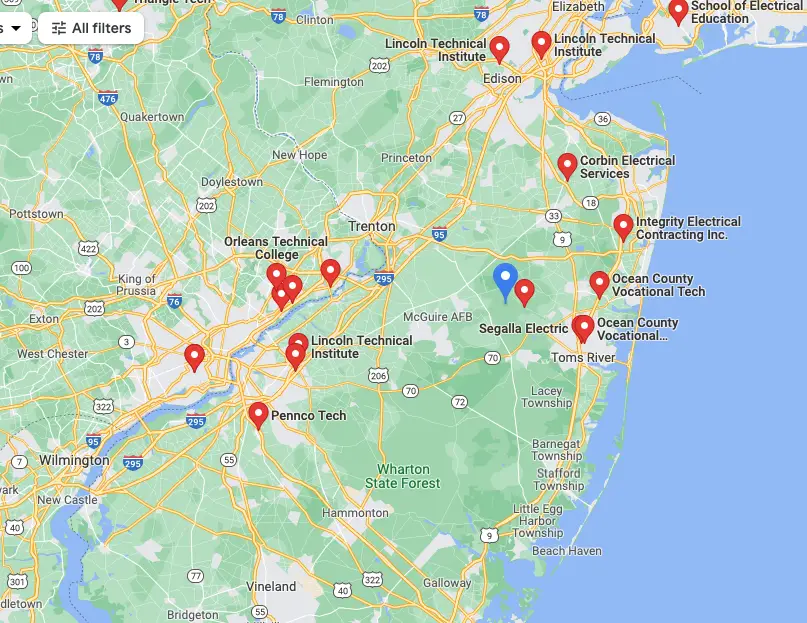There are plenty of educational options for electricians and those aspiring to become an electrician in New Jersey.
Ocean County Vocational Technical School
Offers a course that deals with residential and light commercial electrical wiring for power and lighting. Various types of control devices for power, lighting and security are also introduced. Students are taught how to use several varieties of electrical test equipment. The basics of transformer and motor theory are introduced.
Skills you will learn: Proper use of tools and safe industry work practices, Installation methods for various types of outlet and device boxes, cables, conduits and service equipment, Load calculations for residential branch circuits, feeders and services, Basic introduction to the National Electrical Code, Electrical Theory
South Jersey Electrical Training
SJ Electrical Training offers day and night courses to prospective electricians. They offer pre-apprenticeship training and more advanced courses which include; conduit bending, blueprint reading, motor controls, electrical code, residential wiring, and more.
Union County Vocational Technical Schools
Offers an electrical tech at their adult school. The Electrical Technology class covers Safety and Residential wiring. Students learn how to wire a home. Areas covered include; switches, receptacles, fixtures, panel, meter, and smoke detectors. There is also schematic drawing and blueprint reading along with project estimating. Basic theory and National Electric code are covered.
Electrician Training Program
With 1,200 hours of in-depth instruction, students will learn electrical, motor and generator theory, and then use this information as their starting knowledge base to learn about more advanced topics such as electrical codes, telecommunications, residential & commercial wiring and OSHA requirements. This course of study also includes in-depth instruction on power generation and distribution, blueprint reading and semi-conductor applications such as programmatic logic controllers, alarm and CCTV systems, and photovoltaics. The instruction is broken down into 864 hours of lecture and 336 hours of hands-on shop hours. Upon graduation of this program, the student is ready to join the industry as an electrician apprenticeship.
Electrical and Electronic Systems Technology
Receive hands-on training using tools to properly install and maintain service panels, lighting fixtures, alarm systems, cabling systems, industrial motors, and conduit benders. Learn to install, troubleshoot and service fire alarm systems, home theater equipment, closed-circuit TV systems, satellite/cable TV equipment, and whole-home automation equipment. Get trained in both the high-and-low voltage sides of the industry.
The Electrical “Bootcamp” Training Academy was designed to train pre-apprentices to become efficient and productive early on in their employment in the electrical industry. Our Program is fast, affordable, and supplies ambitious workers for the future of our industry. All graduates will receive an OSHA-30 certification as part of our training.
Modular Style Training
-
-
A module is 3 hours, 2 nights a week. After every 3 modules, you will be tested on your knowledge of the curriculum.
-
Micro-Learning lessons within the module include:
-
Repeating Short Bursts of Information
-
Reference Guide for Future
-
Videos of tasks
-
Gamification
-
-
“Bootcamp” course will be conducted from September through May. Monday & Wednesday and Tuesday & Thursday 5:30pm – 8:30pm
-
Allows pre-apprentices to work during the day and learn at school at night.
-
Hands-on Skills:
-
-
Trained to perform specific tasks
-
Timed to beat the estimate
-
Basic skills to use hand tools & recognize materials
-
Eastwick Education
Program prepares graduates are prepared to enter an apprenticeship with the NJIECA, and upon completion of their first year apprenticeship exam will be awarded second-year apprentice status. Electricians install and maintain electrical wiring systems, supplying light, power, air-conditioning and refrigeration for private and commercial buildings.
Middlesex County Vocational & Technical Schools
Offers a full time adult Electrical Technology Certificate program which prepares the student for entry-level employment within the electrical trades. It is designed for individuals interested in changing careers as well as those who are looking for first time employment in the field. Eight modules include classroom and hands-on instruction, field trips and seminars. Successful completers obtain an OSHA card and credit hours earned may be applied to the related instruction component of a registered apprenticeship program. Curriculum includes a program orientation and instruction in the following courses: Multi Craft Basics; Alternating Current Loads; Magnetism, Conductors & Insulators; Motor Controls; Tools & Supports: Electrical; Transformers & Motors; and Electrical Circuits. Classes meet Monday through Friday from 1:00 – 5:00 PM at the East Brunswick campus.
Kempker’s Educational Services
Offers a variety of electrical educational courses:
Solar Photovoltaic Systems – This 4-hour continuing educational course will look at solar PV systems including the array circuit(s), inverter(s), and controller(s) for such systems. The systems covered by this article may be interactive with other electrical power production sources or stand-alone or both, and may or may not be
connected to energy storage systems such as batteries. These PV systems may have ac or dc output for utilization.
Hazardous Locations – Articles 500 through 504 cover the requirements for electrical and electronic equipment and wiring for all voltages in Class I, Divisions 1 and 2; Class II, Divisions 1 and 2; and Class III, Divisions1 and 2 locations where fire or explosion hazards may exist due to flammable gases, flammable liquid–produced vapors, combustible liquid–produced vapors, combustible dusts, or ignitable fibers/flyings.
Single Family Residential Calculations – This 4-hour continuing educational course will take a look at the requirements for calculating branch-circuit, feeder, and service loads based on the table and information provided within the National Electrical Code. Part I provides general requirements for calculation methods while Part II provides calculation methods for branch-circuit loads. Parts III and IV provide calculation methods for feeder and service loads while Part V provides calculation methods for farm loads.
Motor Conductor and Protection Calculations – This 4-hour continuing educational course is part of the 34-hour package and will meet your New Jersey electrical contractors license renewal requirements.


